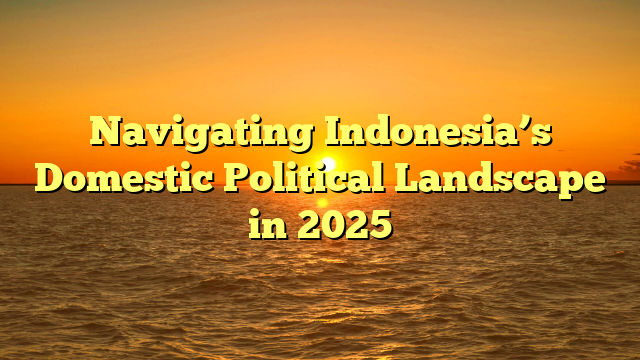In 2025, Indonesia’s domestic political landscape is undergoing a dynamic transformation, marked by shifting alliances, new leadership priorities, and evolving policy debates. As Southeast Asia’s largest democracy, the nation stands at a crossroads, balancing economic growth ambitions with the demands of social stability and democratic governance. Political discourse is increasingly shaped Pattimura4d by both traditional concerns—such as infrastructure, education, and poverty reduction—and emerging issues like climate resilience, digital governance, and political transparency.
A Year of Political Realignment
Following the 2024 general elections, Indonesia witnessed a period of political realignment as coalition parties recalibrated their positions. While the presidential transition proceeded smoothly, the composition of the cabinet reflected a careful balancing act between accommodating political allies and integrating technocrats with specialized expertise. This approach has aimed to maintain stability while signaling a commitment to policy-driven governance. However, internal tensions remain as parties negotiate influence over key ministries, particularly those controlling economic and resource-related portfolios.
Legislative Priorities and Economic Vision
The government’s legislative agenda for 2025 has centered on driving economic competitiveness, boosting domestic industries, and strengthening social safety nets. A key policy focus has been the “National Green Economy Initiative,” a multi-year plan to integrate sustainable practices into manufacturing, mining, and agriculture. This is complemented by efforts to modernize the digital economy, including the expansion of internet infrastructure to underserved rural areas. Nevertheless, debates in the House of Representatives have revealed sharp divisions over the pace of reforms, funding mechanisms, and the trade-offs between economic growth and environmental protection.
Rising Political Polarization
Despite Indonesia’s longstanding tradition of consensus-based politics, recent years have seen an uptick in political polarization, particularly in urban areas. Social media has amplified both legitimate policy debates and the spread of misinformation, influencing public opinion in unprecedented ways. This polarization has also deepened ideological divides within parliament, with some factions pushing for more conservative social policies while others advocate progressive reforms. Analysts warn that sustained polarization could erode the collaborative spirit that has historically characterized Indonesian politics.
The Role of Civil Society
Civil society organizations (CSOs) remain an influential force in shaping domestic politics. From advocating for anti-corruption measures to pushing for gender equality and environmental protections, CSOs have helped keep the government accountable. In 2025, their role has been particularly crucial in monitoring the implementation of regional autonomy laws, ensuring that local governments adhere to transparency and efficiency standards. However, some activists have expressed concern about regulatory proposals that could restrict the operations of NGOs, citing risks to democratic freedoms.
Regional Dynamics and Decentralization
Indonesia’s decentralized governance structure continues to be both a strength and a challenge. While local governments enjoy significant autonomy, disparities in capacity and resources have led to uneven policy implementation. Provinces with robust governance frameworks have managed to attract foreign investment and improve public services, while others struggle with bureaucratic inefficiency and corruption. The central government’s recent proposal to enhance oversight over regional budgets has sparked debate about the balance between autonomy and accountability.
Looking Ahead
As Indonesia moves deeper into the decade, its political future will likely hinge on three interrelated factors: the ability of political leaders to manage coalition stability, the capacity to implement reforms effectively, and the resilience of democratic institutions in the face of rising polarization. While challenges are significant, Indonesia’s track record of peaceful political transitions and vibrant civic engagement offers grounds for cautious optimism. The nation’s ability to navigate its domestic political complexities will not only determine its internal stability but also shape its role as a leading voice in regional and global affairs.
